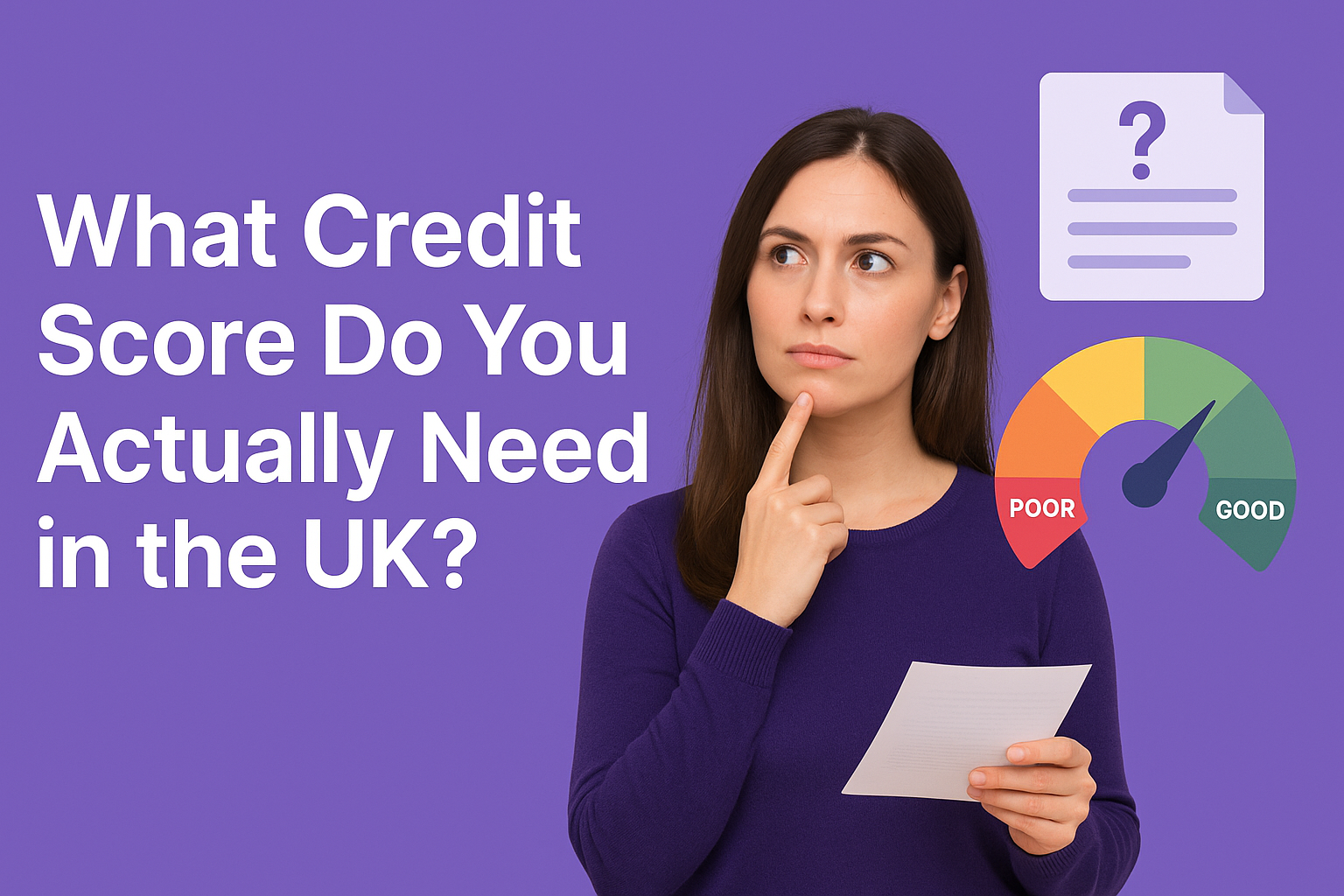 Credit Scores
Credit ScoresWhat Credit Score Do You Actually Need in the UK?
Published on 7/23/2025
For Loans, Mortgages, and Credit Cards — Here's What Lenders Really Look For
When it comes to borrowing money in the UK, one question pops up again and again:
“Is my credit score good enough?”
The answer? It depends on what you’re applying for.
Whether it’s a credit card, a personal loan, or a mortgage, lenders all have different expectations — and not all credit scores are created equal.
Let’s break it down so you know where you stand and what to do next.
What Is a Credit Score in the UK?
A credit score is a number that represents how risky (or trustworthy) you are as a borrower.
It’s based on your past credit behaviour: how often you borrow, whether you repay on time, and how much debt you already have.
In the UK, there isn’t one universal score. Instead, three major credit reference agencies (CRAs) each have their own system:
Credit Agency Score Range What’s a "Good" Score?
Experian 0 – 999881+ = Good / 961+ = Excellent
Equifax 0 – 1000531+ = Good / 811+ = Excellent
TransUnion 0 – 710604+ = Good / 628+ = Excellent
💡 Tip: Lenders don’t see your "score" — they see your credit report, then decide their own rating based on it.
What Credit Score Do You Need for a Credit Card?
For premium or reward credit cards, most lenders want to see:
- Good to Excellent credit (e.g. Experian 881+)
If your score is poor or fair, you still have options:
- Credit builder cards with lower limits and higher interest rates
- Great if you’re trying to rebuild your score or have a limited history
What Credit Score Do You Need for a Personal Loan?
There’s no fixed minimum, but generally:
- ✅ Good score = access to lower interest rates
- ❌ Poor score = limited lenders or higher APRs
Most banks consider:
- Your credit history
- Debt-to-income ratio
- Stability (employment, address history)
Some lenders specialise in bad credit loans, but always check the APR.
🔗 Compare Loans by APR, Term & Amount →
🔧 Or try the Loan Repayment Calculator
What Credit Score Do You Need for a Mortgage?
For a mainstream mortgage, most lenders prefer:
- Good to Excellent (Experian 881+ / Equifax 531+)
But…
- You can still get a mortgage with poor or fair credit
- You may need a larger deposit, higher rates, or a specialist broker
Missed payments, CCJs, or payday loans on your record?
You’ll likely need to go with a specialist lender, who’ll assess your application more manually.
🔗 Use our Mortgage Affordability Checker →
What If Your Credit Score Is Low?
Don’t panic — here’s how to start improving it:
- 🔄 Register to vote (boosts your visibility to CRAs)
- 💳 Use a credit builder card and repay in full monthly
- 📊 Check your credit file regularly for mistakes
- ⛔ Avoid payday loans or multiple credit applications at once
- 🕰️ Build a history of on-time payments (even for bills like your phone)
💡 Some apps and services (like Experian Boost or Loqbox) can help improve your score for free.
Let Nexa Help You Choose the Right Option
Rather than guessing if your score is “good enough,” use our free tools to make smarter decisions.
✅ Compare credit cards, loans, and secured products
✅ Calculate realistic repayments
✅ Use AI tools like Ask Nexa to get personalised suggestions
📍 No hidden fees. No jargon. Just smart, unbiased tools.
Key Takeaways
- There’s no universal credit score requirement in the UK — it varies by lender and product.
- A “good” credit score improves your odds of getting approved and landing better rates.
- Even with bad credit, there are options — just be careful of high-interest traps.
- Use tools on Nexathe to make smarter, more confident financial decisions.
